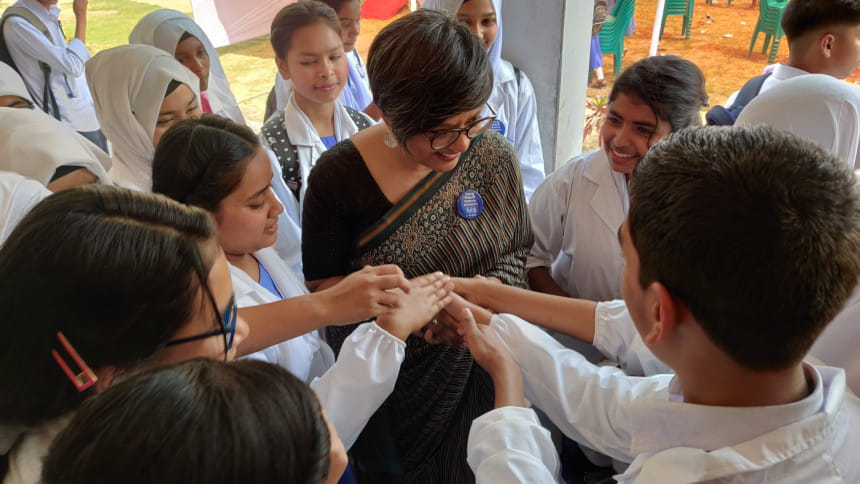Science by and for the many, not the few

"On a late night, a series of insightful discussions and two people grappling with Google forms for the first time gave rise to a project, brought into being with nothing more than a name and the promise of a couple thousand dollars. However, at its core, it carried a vision that breathed life into 'Building Scientists for Bangladesh,'" reminisces Dr Senjuti Saha, Director and Senior Scientist at Child Health Research Foundation (CHRF), and Founder of Building Scientists for Bangladesh (BSB).
CHRF is a non-profit organisation in Bangladesh dedicated to preventing infections and saving lives. BSB emerged in early 2022 as a means to nurture a generation of young individuals aspiring to become scientists and community leaders.
Dr Saha illustrates the motivations behind this initiative, saying, "Science has always played a significant role in my life due to both my parents being microbiologists. Upon my return to Bangladesh after my studies, I began working with my father at CHRF. Establishing the genomics facility meant that we could sequence numerous bacteria and viruses. After becoming the first to sequence SARS-CoV-2 in the country during the pandemic, we garnered a lot of media attention."
"While all of this was unfolding, I stumbled upon Facebook message requests from mothers and daughters who had never witnessed a female scientist contributing to the country's work. That's when I recognised my privilege and realised I had taken the accessibility of science for granted. I felt a profound sense of responsibility to extend the opportunities that my parents had provided for me," states Dr Saha.
Currently, BSB operates through three streams. The first two streams targeted towards high school students are intended to create awareness and interest among students about science. This is done by organising discussions with celebrated scientists and visits to hospitals and laboratories to safely conduct experiments.
The third stream targets undergraduate and postgraduate students, as well as professionals. This stream focuses on building research capacity through specialised training programs.
Explaining the necessity of these programs, Shruty Paula Rodrigues, Executive Assistant at CHRF, highlights that when students visit microbiology and molecular biology labs to observe their operations, it sparks their curiosity and provides a more effective way to explore their interests, particularly because many universities lack hands-on facilities.
When discussing the selection criteria and the aim of inclusivity and accessibility, Jaasia Momtahena Hafsa, Molecular Biologist and Science Communicator at CHRF, emphasises a critical aspect. She points out that individuals from more privileged backgrounds may not fully grasp the challenges faced by families who cannot prioritise their children's education. Therefore, in selecting schools for science camps, they deliberately reach out to underserved communities.
Nazifa Tabassum, a Microbiologist and Science Communicator at CHRF, explains their approach to internships and training opportunities. They do not focus on individuals' grades. Instead, they prioritise applicants' genuine enthusiasm for cultivating their passion, an open mindset, and a commitment to fostering a safe and inclusive environment.
Adittya Arefin, Senior Training Officer at CHRF, adds that they actively work against the declining trend of women entering STEM fields in Bangladesh. While their selection process is unbiased, a majority of their applications come from girls, with 76 percent of Stream 2 trainees and 67 percent of Stream 3 trainees identifying as women. They also offer need-based scholarships to applicants facing financial constraints.
Dr Saha emphasises the importance of accessibility and acknowledges that when girls from rural areas participate in their programmes, adapting to a new environment can be challenging, and additional barriers may hinder their participation. To address this, when a group of girls from the same village joins them, one of the mothers is often designated as a chaperone.
The commitment to accessibility remains an ongoing process, with continuous efforts to improve based on feedback. They have adapted their processes to accommodate individuals with disabilities, with specific committees assessing need-based scholarship applications to ensure impartiality.
Adittya shares a recent application experience, where an individual disclosed having a hearing disability. In response, they identified software that would enable this person to learn on par with other students. This prompted them to adapt and accommodate individuals with disabilities.
Muhammad Shafiul Alam Mondal, Training Officer at CHRF, also discusses the psychological impact of their programs. Bangladeshi students often perceive themselves as falling behind in scientific research and breakthroughs, attributing this to limited opportunities and access. However, when individuals engage in hands-on work and interact with people from diverse backgrounds, the disparities in their skills or abilities become less significant. The essential transformation occurs within their mindset.
Initiatives like BSB come with their own set of challenges. Dr Saha mentions that their most significant challenge so far has been finding sufficient space to accommodate the overwhelming number of interested participants. Lab experiments and maintenance can also be costly, making funding tight.
Dr Saha acknowledges that while their approach has become more organised since the inception of BSB, they see this as just the initial phase. Their aspirations extend to establishing fully-equipped laboratories, offices, and local training centres outside Dhaka. Until now, their primary focus has been on research at CHRF, and BSB represents their entry into education and training.
Nazifa supplements this message by saying that those interested can visit their website or reach out to them via email to learn more. Additionally, there are opportunities for people to support various projects, including sponsoring master's theses in genomics.
Shafiul, concluding on a hopeful note, expresses a resolute vision for CHRF. One of their primary goals for the future is to decentralise their efforts, expanding beyond Dhaka. They eagerly anticipate a future where they are building scientists for Bangladesh, from all corners of the country.
Shanum is a student of Bangladesh International Tutorial.

 For all latest news, follow The Daily Star's Google News channel.
For all latest news, follow The Daily Star's Google News channel. 









Comments